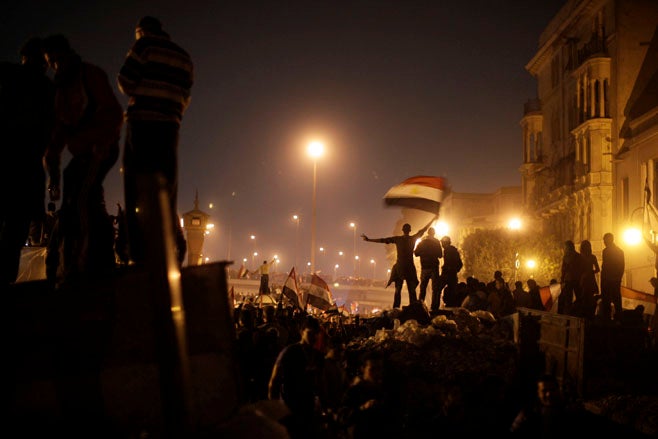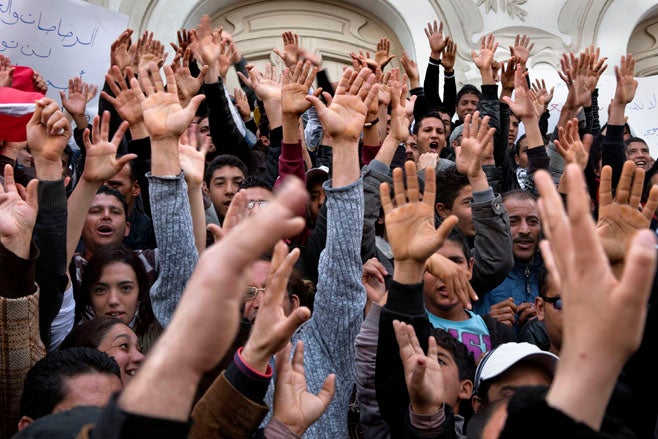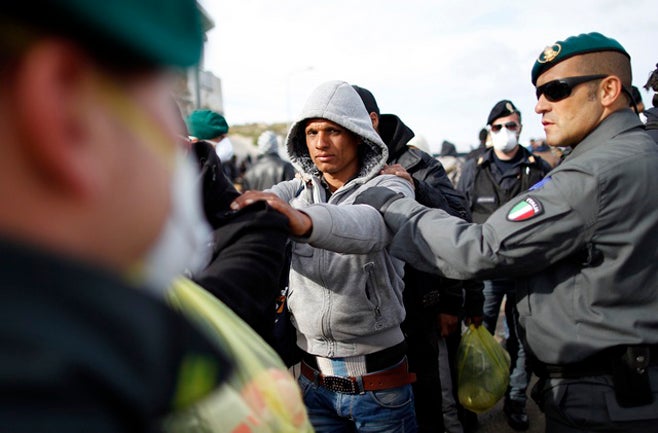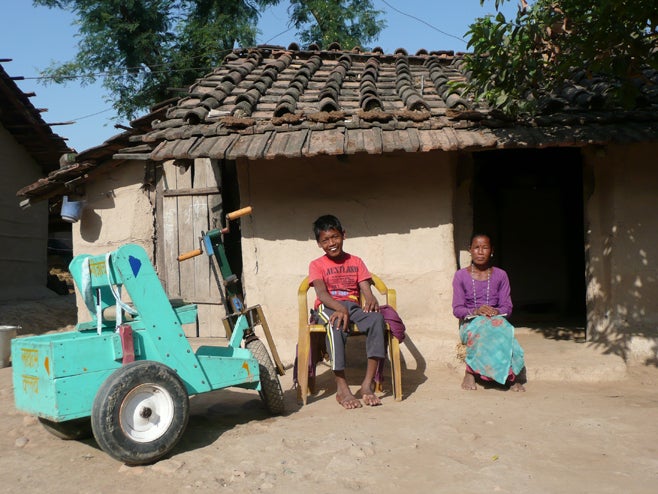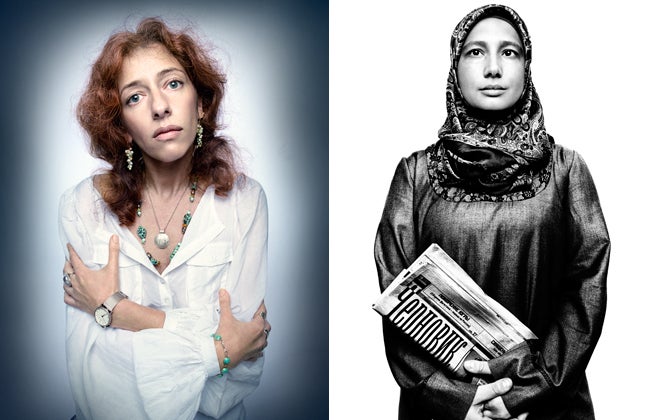Still reeling from the devastating January 12, 2010 earthquake and subsequent deadly cholera epidemic, Haiti inaugurated Michel Joseph Martelly as president on May 14, 2011, after a contested electoral process. The government stalled for over four months as parliament failed to ratify two consecutive nominees for prime minister, before confirming Martelly’s third pick, Garry Conille, on October 4, 2011.
Weakened by the electoral and political crises, reconstruction efforts made little progress in rebuilding government or private structures. Despite this, the number of people living in informal settlements created after the earthquake dropped from some 1.3 million people in late 2010 to approximately 550,000 by September 2011.
The continuing humanitarian crisis created by the earthquake and cholera epidemic hindered Haiti from addressing many of the chronic human rights problems exacerbated by the quake, including violence against women and girls, inhuman prison conditions, and impunity for past human rights abuses. Moreover, increasing pressure to close camps on both private and public land has led to a growing number of evictions.
The Justice System
Haiti has been plagued by high levels of violent crime for years, but the United Nations secretary-general noted that trends since the earthquake demonstrate an increase in all major categories of crimes, including murder, rape, and kidnapping. Violent demonstrations and civil unrest related to the extended and contested electoral process contributed to this rise.
The weak capacity of the Haitian National Police (HNP) has contributed to overall insecurity in Haiti. The reform and strengthening of police remains a priority of the government and of the UN Stabilization Mission in Haiti (MINUSTAH). There has been progress in adding to HNP ranks, but obstacles such as the continued employment of compromised officers threaten Haiti’s stability.
Police abuses and deaths in detention in select commissariats threaten to taint HNP’s improving reputation of professionalism. In 2011 MINUSTAH and the Office of the UN High Commissioner for Human Rights(OHCHR) investigated several alleged cases of extrajudicial killings, arbitrary arrests, and ill-treatment of detainees and urged the police and judiciary to make systematic responses to cases of abuse. A trial in the case of alleged police killings in Les Cayes prison on January 19, 2010, began in mid-October. The outcome of the trial was unknown at this writing.
Haiti’s justice system, long-troubled by politicization, corruption, resource shortages, and lack of transparency, worked slowly to recover in 2011. Some tribunal buildings were constructed and some magistrates received training in the country, while others did so in France. President Martelly appointed a chief judge and one other judge approved by the Senate to the Supreme Court of Haiti in October, but a political stalemate between President Martelly and the Senate prevented the remaining four vacant positions from being filled.
Detention Conditions
Haiti’s chronically and severely overcrowded prison system suffered damage in the earthquake, leading to even more limited cell space as well as dire prison conditions. Reconstruction projects increased cell space by 28 percent this year. The percentage of pre-trial and illegal detainees is still very high, but international actors worked with prison and judicial officers to review cases of potential illegally detained inmates, leading to the release of several hundred people.
The negative health impact of substandard prison conditions became life-threatening with the arrival of cholera. In the first month of the epidemic, the HNP announced that 19 prisoners nationwide had died from the disease. In January a recent deportee from the United States died of cholera-like symptoms after less than two weeks in detention, leading the Inter-American Commission for Human Rights to grant a petition for precautionary measures calling for the suspension of further deportations from the US.
Women’s and Girls’ Rights
High rates of sexual violence existed before the earthquake, but the precarious safety and economic situation after the earthquake has left some women and girls even more vulnerable to such abuse. Many women lost their homes and livelihoods in the quake and now live in informal settlements or rely on host families for shelter. The UN and HNP have increased their security presence in some camps, and the UN Population Fund and humanitarian organizations have worked to increase lighting in many camps. Yet Human Rights Watch found that some victims have difficulty accessing post-rape medical services in sufficient time to prevent unwanted pregnancy.
Some women and girls in post-earthquake Haiti lack access to family planning and prenatal and obstetric care. Pregnancy rates in camps for displaced people are three times higher than urban rates of pregnancy were before the earthquake. Human Rights Watch found that many women and girls in camps do not know where to get birth control or prenatal care even though these services exist. Many have given birth in tents or some on the street en route to the hospital because of transportation difficulties.
Human Rights Watch also found that women’s lack of access to economic security leads some women to trade sex for food or other necessities without using contraception, compounding the impact of their lack of access to reproductive health services and increasing chances for unintended pregnancy and disease. In particular, pregnant women and lactating mothers face increased hardships, as do women with disabilities and elderly women, due to constrained mobility and greater need for health services, food, and water.
Women also have difficulty participating in decision-making about recovery and reconstruction.
Children’s Rights
Prior to the earthquake, only about half of Haiti’s primary school-age children attended school. The UN Children’s Fund estimates that the quake damaged or destroyed almost 4,000 schools and that 2.5 million children experienced prolonged interruption in their education. Schools resumed several months after the earthquake; however, many experienced a sharp drop in enrollment. President Martelly introduced a plan for free universal education early in his administration, and classes began October 3, 2011, with the first phase of his plan in place.
The use of child domestic workers in Haiti, known as restavèks, continues. Restavèks are children, 80 percent of whom are girls, from low-income households sent to live with other families in the hope they will be cared for in exchange for performing light chores. These children are often unpaid, denied education, and physically and sexually abused. UN and civil society organizations warn that a number of unaccompanied minors remaining in camps are vulnerable to this form of forced labor or to trafficking.
Accountability for Past Abuses
Former President-for-Life Jean-Claude Duvalier returned to Haiti on January 16, 2011, after nearly 25 years in exile. He was quickly charged with financial and human rights crimes allegedly committed during his 15-year tenure.
From 1971 to 1986 Duvalier commanded a network of security forces that committed serious human rights violations, including arbitrary detentions, torture, enforced disappearances, rape, and summary executions. Thousands of Haitians were victims of extrajudicial killings or otherwise died from torture or inhuman detention conditions. Many more were forced to flee the country, building the modern Haitian diaspora.
Duvalier’s prosecution faces many obstacles, including the fragility of Haiti’s justice system and the absence of a safe environment for his continued investigation and prosecution. Lack of political will from the international community to support the prosecution leaves the government without the adequate resources or technical assistance needed for a robust judicial process. Victims and their families feel intimidated by Duvalier’s lawyers and supporters, who have interrupted victims’ audiences before the investigative judge, yelled at victims in public markets, and otherwise created an environment that discourages witnesses and victims from coming forward. In September Duvalier’s lawyers disrupted an Amnesty International press conference supporting the prosecution.
Key International Actors
MINUSTAH has been present in Haiti since 2004, playing a prominent role in increasing stability. A contingent of the peacekeeping mission stationed in central Haiti is alleged to be the source of the cholera epidemic, leading to demonstrations against the force during the year. A UN independent investigation found that the cholera epidemic was caused by a confluence of circumstances, while numerous scientific analyses claim evidence that MINUSTAH soldiers most likely introduced the strain.
In September media outlets released a video of Uruguayan soldiers harassing an 18-year-old Haitian young man in a sexually explicit manner. The boy alleges he was raped, and members of the Uruguayan contingent were sent home to face a criminal investigation. The incident fueled anti-MINUSTAH sentiments ahead of the renewal of its mandate in October. The Security Council nevertheless extended the mission’s mandate through October 15, 2012, with a reduction in the number of troops to pre-quake levels.
The Interim Haiti Recovery Commission (IHRC), provided for in the state of emergency law that parliament passed in April 2010, continued to operate through most of 2011. An extension of the IHRC did not pass parliament before the end of its mandate, making its future uncertain at this writing. The commission’s mandate is to oversee billions of dollars in reconstruction aid and to conduct strategic planning and coordination among multi-lateral and bilateral donors, NGOs, and the private sector. Former US President Bill Clinton remains a co-chair of the IHRC and UN special envoy for Haiti.
